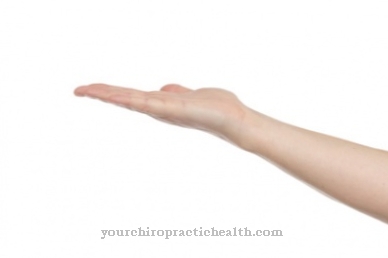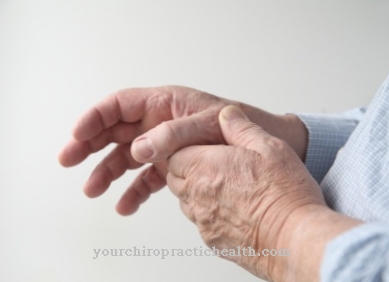Stomach cramps or Stomach cramps are severe stomach pains that change in intensity. They usually appear suddenly and unexpectedly, but can also stop quickly. Stomach cramps can result from a wide variety of causes. Therefore, stomach cramps should be carefully investigated.
What are stomach cramps?

Mostly cramping and sudden severe stomach pains are also known as stomach cramps. In most cases, the seizures are very brief, but they recur at more or less regular intervals.
The intensity of the pain associated with stomach cramps is thus also described as increasing and decreasing swelling. Occasionally, the stomach cramps can lead to referred pain in the chest and back.
Stomach cramps are often associated with vomiting and diarrhea. However, they can also only lead to loss of appetite, stomach pressure or a feeling of anxiety.
causes
The causes of stomach cramps can be very different. Often an upset stomach or an infection of the gastrointestinal tract is the cause.
But an inflammation of the stomach lining, the so-called gastritis, can be the cause of stomach cramps. This can either be caused by bacteria, drugs, or it can be due to an autoimmune disease.
Occasionally, a disturbed movement of the stomach muscles can lead to stomach cramps, because digestion cannot be carried out properly. An existing food allergy or intolerance to certain foods can, however, also manifest in severe stomach cramps.
In severe cases, the stomach cramps can also be caused by a stomach ulcer or stomach cancer. But not only physical, but also psychological problems can be the cause. Excessive stress or dissatisfaction and social issues can cause stomach cramps.
You can find your medication here
➔ Medicines for stomach ailments and painDiseases with this symptom
- abdominal influenza
- Drug addiction
- Gastric mucosal inflammation
- Stomach cancer
- Food allergy
- Gastric ulcer
course
Stomach cramps often lead to a tight abdominal wall. Usually the abdomen is drawn in, but in rare cases it is also inflated like a balloon. The cramp-like pain is often followed by severe exhaustion.
Depending on the cause of the stomach cramps, the course can be very different. An infection or upset stomach usually goes away on its own. Especially if vomiting or diarrhea occurred.
In the case of a food allergy, stomach cramps occur again and again as soon as the intolerable food is consumed. The severity of the pain can even increase as the allergy progresses.
In the case of gastritis, the cause should be combated as quickly as possible. Otherwise there is a risk of worsening stomach cramps or even chronic inflammation of the gastric mucosa. However, if left untreated, inflammation of the lining of the stomach can also turn into a stomach ulcer or cause stomach cancer.
Complications
Stomach cramps are a very general term that can have many causes. A very common cause of stomach cramps is a gastrointestinal infection. Such an infection is often associated with diarrhea, fever and chills. A doctor does not have to be consulted with such an infection. A doctor should only be consulted if there is no improvement after three to four days.
Especially if the body loses too much fluid as a result of a gastrointestinal infection, it can lead to serious complications. These complications manifest themselves in the form of a slight to severe dizziness. It can even lead to a fainting attack. If the appendix is to blame for severe stomach cramps, a doctor should also be consulted urgently.
Otherwise there is a risk of a ruptured appendix, which can even be fatal. With infections of all kinds, it is very important to drink enough fluids. Of course, this applies not only to gastrointestinal infections, but also to stomach cramps in general. You should avoid drinks with a high carbon dioxide content. Vitamin-rich juices or still water are more recommended at this point.
When should you go to the doctor?
Stomach cramps can vary in severity, so that the person affected can first resort to free medication or home remedies in the event of mild to moderate pain. Active ingredients that calm the stomach are suitable for this. This includes, for example, a chamomile tea. Fatty foods or foods that are heavy in the stomach should definitely be avoided. Otherwise, the individual symptoms can get significantly worse. If your own home remedies do not help after one or two days, you should urgently consult a doctor.
Your own family doctor is the right address in such a case. A family doctor will try to diagnose what is causing the stomach cramps. In most cases there is an infection that affects the gastrointestinal tract. Individual foods can also hit the affected person's stomach, causing stomach cramps and watery diarrhea. These two clinical pictures should be treated by a doctor and with the help of appropriate medication.
This prevents the disease from spreading further in the body. Adequate fluid intake is also very important, as the body loses a lot of water if diarrhea persists. However, stomach cramps should be relieved very quickly with the right treatment.
Doctors & therapists in your area
Treatment & Therapy
Treatment of stomach cramps must of course be carried out depending on the cause. However, any other abdominal disease such as kidney stones or intestinal obstruction should be ruled out beforehand, as these can also show similar symptoms.
In simple cases of stomach cramps, an attempt can first be made to combat them by applying external heat. Drinking chamomile or mint tea can also bring relief. If stomach cramps occur regularly due to irritation of the stomach lining or digestive problems, the regular intake of sea buckthorn oil, caraway, fennel, ginger or coriander can be helpful. These home remedies are known to calm the stomach.
In the case of a bacterial infection of the stomach lining, antibiotic treatment of this infection is necessary. The excessive gastric acid production is moderated by a proton pump inhibitor.
If the bacterial infection has already led to a stomach ulcer, treatment with antibiotics and proton pump inhibitors must also be carried out here. This is usually enough to allow the ulcer to heal. However, a gastric ulcer that was not caused by a bacterial infection can also be healed by inhibiting gastric acid production.
If the stomach cramps are caused by a cancerous ulcer, this must be removed surgically. After the stomach has healed, stomach cramps can be expected to subside.
Outlook & forecast
As a rule, stomach cramps occur when there is an infection, a bad food or an allergic reaction to a certain food. In these cases, stomach cramps often go away on their own and therefore do not need additional treatment by a doctor. A gastrointestinal tract infection is often accompanied by diarrhea and vomiting, which are common symptoms of this disease.
However, if the stomach cramps become unbearable and lead to very severe pain, a doctor must be consulted. This can be a serious infection, which must be treated by a doctor in any case.
In most cases, the treatment itself takes place with the help of medication; surgical treatment is only necessary for very serious infections. In most cases, the infections can be fought with antibiotics so that there are no further symptoms.
Ordinary everyday life is no longer possible with stomach cramps, so that the person affected can usually no longer go to his workplace. The severe stomach cramps can also be caused by ulcers or other inflammations in the stomach, which the doctor can diagnose with the help of a gastroscopy. These can be surgically removed.
You can find your medication here
➔ Medicines for stomach ailments and painprevention
To prevent stomach cramps, irritation of the stomach should be avoided as much as possible. Excessive consumption of alcohol, medication (mostly tablets), caffeine, tein or nicotine should therefore be prevented.
But too much stress and uncomfortable company, which hits you on the stomach, should be avoided if possible. Furthermore, the mentioned home remedies can be taken regularly to calm the stomach in order to avoid stomach cramps.
You can do that yourself
In most cases, stomach cramps are triggered by an intolerance, an allergy or an infection in the gastrointestinal tract. In these cases, the patient should definitely avoid the food that caused the stomach cramps. It can take several days for the body to completely break down the ingredient and for the stomach cramps to go away.
It is not uncommon for stomach cramps to be accompanied by diarrhea and vomiting. In these cases, an easily digestible food is suitable for the stomach and the absorption of plenty of fluids, otherwise the body will become dehydrated due to the diarrhea. Painkillers or activated charcoal can also be used against stomach cramps. The activated charcoal detoxifies the stomach. Painkillers shouldn't be used for long periods of time.
Herbal teas and a generally healthy diet also help against stomach cramps. Less severe stomach cramps can also be soothed with warmth. A hot water bottle is often used for this. Cases If the cramps persist and cause excruciating pain, a doctor should be consulted. It may be a serious infection or inflammation that needs to be treated with antibiotics. In most cases, however, the stomach cramps go away on their own. To speed up the healing process, the body should have an opportunity to rest and relax.












.jpg)



.jpg)










.jpg)
